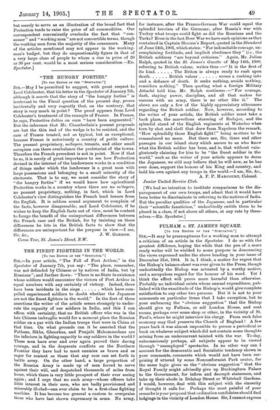SIR,—May I be permitted to suggest, with great respect to
Lord Colchester, that his letter in the Spectator of January 7th, although it asserts that the story of "the hungry forties" is irrelevant to the Fiscal question of the present day, proves incidentally and very cogently that, on the contrary, that story is very much in point ? The proof appears from Lord Colchester's treatment of the example of France. In France, he says, Protective duties on corn " have been augmented." But the inference that Mr. Chamberlain's present proposals are but the thin end of the wedge is to be resisted, and the case of France treated, not as typical, but as exceptional, because France is notoriously a country of petite culture. The peasant proprietary, metayers, tenants, and other small occupiers can there overbalance the proletariat of the towns. Therefore the French precedent is not in point. Now if that be so, it is surely of great importance to see bow Protection devised in the interest of the landowners works in a condition of things under which the landowner is a great man with large possessions and belonging to a small minority of the electorate. That is to say, we must consider the story of "the hungry forties" if we would know how agricultural Protection works in a country where there are no metayers, no peasant proprietary, nothing, in fact, which in Lord Colchester's view distinguishes the French land tenure from the English. It is seldom sound argument to complain of the facts, however disagreeable; and Lord Colchester, if he wishes to keep the English facts out of view, must be content to forego the benefit of the unimportant differences between the French case and the British, for by insisting on those differences he lets in the British facts to show that the differences are unimportant for the purpose in view.—I am,
Sir, &c., J. W. GORDON. Cocoa Tree, St. James's Street, S.W.






































 Previous page
Previous page